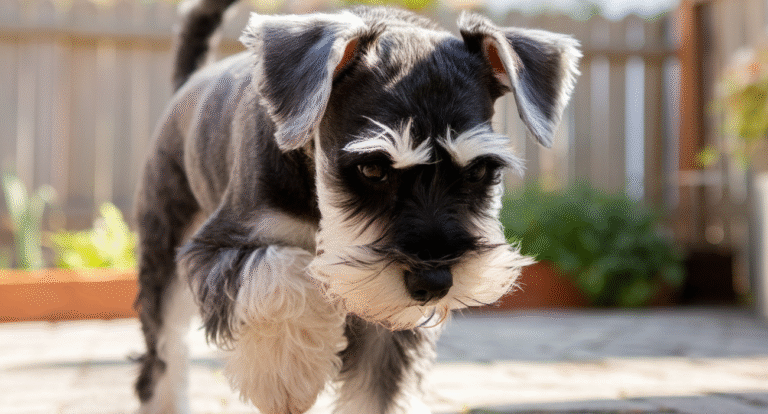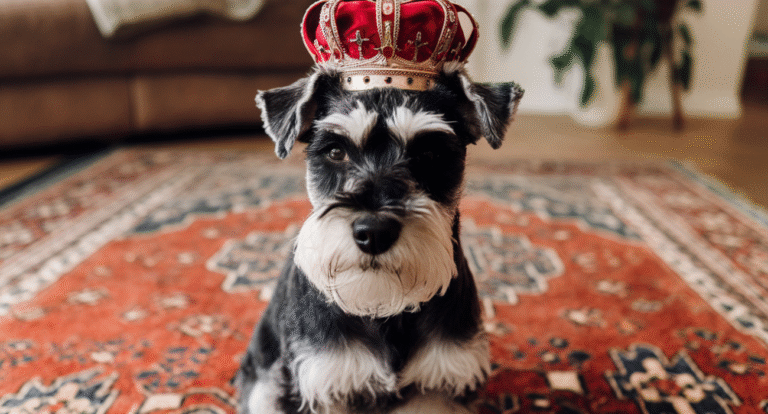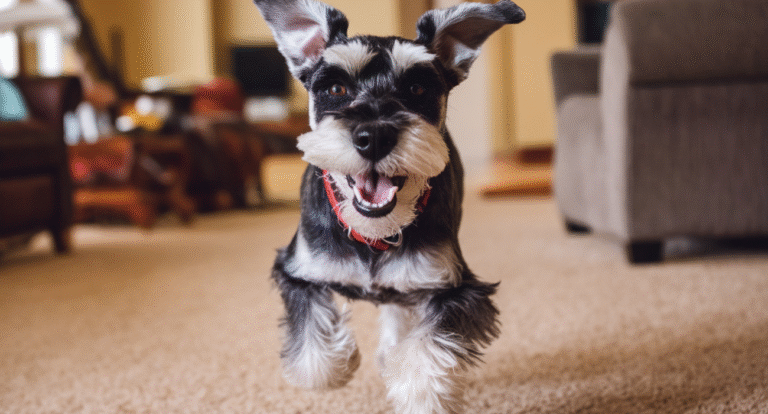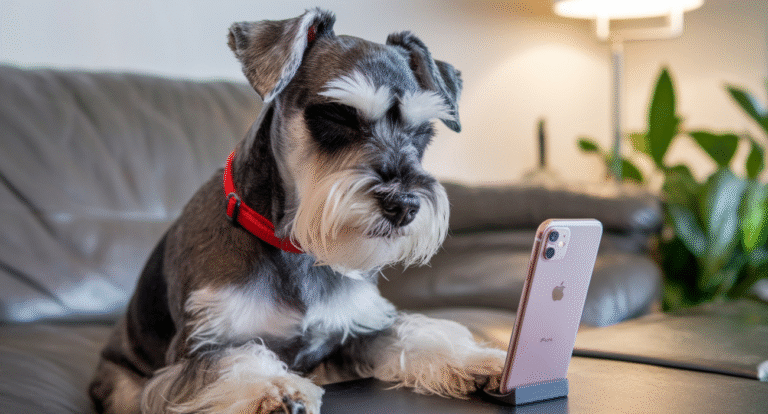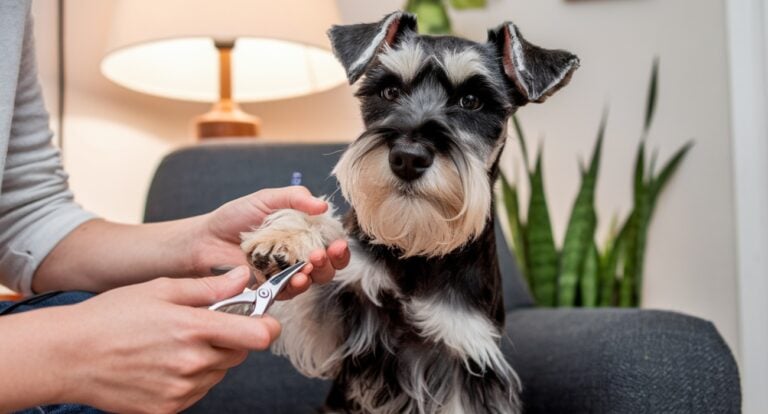Does your Schnauzer follow you from room to room, acting like your personal shadow? There’s a reason for that! Schnauzers are known for forming incredibly strong bonds with their owners, often becoming deeply attached to their favorite humans. But what’s behind this clingy behavior? In this article, we’ll uncover the psychology of Schnauzer attachment and why your pup can’t seem to get enough of you. Get ready to feel even more flattered by your devoted furry companion!
The Schnauzer’s Historical Bond with Humans
Schnauzers have a rich history of working alongside humans, which has significantly influenced their attachment behaviors.
These bearded beauties originated in Germany, where they were bred as versatile farm dogs. Their primary duties included guarding property, herding livestock, and hunting vermin.
This close working relationship with humans fostered a strong bond between Schnauzers and their owners. Over generations, this connection became deeply ingrained in their genetic makeup.
As a result, modern Schnauzers still carry this innate desire to be close to their human family members, even though they may no longer serve their original working purposes.
The Schnauzer’s historical role as a guardian also contributes to their attachment. They view their human family as their “flock” and feel a strong sense of responsibility to protect and stay close to them.
The Schnauzer’s Unique Personality Traits
Schnauzers are known for their distinctive personality traits that contribute to their attachment tendencies.
These dogs are incredibly intelligent and quick learners. This intelligence allows them to form strong emotional bonds with their owners and understand human cues and emotions.
Schnauzers are also naturally affectionate and crave human attention. They thrive on physical touch and emotional connection with their favorite people.
Another key trait is their loyalty. Once a Schnauzer bonds with their owner, they become fiercely devoted and will often choose one family member as their primary attachment figure.
Their playful and energetic nature means they’re always eager to engage with their humans, whether it’s through games, training sessions, or simply following them around the house.
Lastly, Schnauzers have a strong sense of curiosity. This trait makes them want to be involved in everything their humans do, further strengthening their attachment.
The Role of Early Socialization
Early socialization plays a crucial role in shaping a Schnauzer’s attachment behaviors.
Puppies that are well-socialized with humans from a young age tend to form stronger, healthier attachments to their owners later in life.
Positive experiences with humans during the critical socialization period (between 3 and 16 weeks of age) help Schnauzers develop trust and confidence in human interactions.
Proper socialization also helps prevent fear-based attachment issues, such as extreme separation anxiety or overly clingy behavior.
Schnauzers that receive consistent, loving care during their early months are more likely to develop secure attachments to their owners.
However, it’s important to note that even adult Schnauzers can form strong attachments to new owners, thanks to their adaptable and affectionate nature.
The Impact of Breeding and Genetics
Selective breeding has played a significant role in enhancing the Schnauzer’s attachment tendencies.
Over generations, breeders have selected for traits like loyalty, affection, and trainability, all of which contribute to a Schnauzer’s propensity for forming strong bonds with humans.
Genetics also influence a Schnauzer’s temperament and personality, which in turn affects their attachment style.
Some Schnauzers may be genetically predisposed to being more clingy or anxious, while others may be naturally more independent.
It’s worth noting that there can be slight variations in attachment tendencies between the three Schnauzer sizes (Miniature, Standard, and Giant), partly due to differences in their breeding histories.
Despite these genetic factors, environment and upbringing still play crucial roles in shaping a Schnauzer’s attachment behaviors.
The Schnauzer’s Need for Mental Stimulation
Schnauzers are highly intelligent dogs that require regular mental stimulation, which often strengthens their bond with their owners.
These clever canines thrive on problem-solving activities and interactive games, which typically involve their human companions.
Training sessions provide an excellent opportunity for mental exercise and reinforce the Schnauzer’s attachment to their owner through positive reinforcement.
Without adequate mental stimulation, Schnauzers may become bored and develop destructive behaviors or excessive clinginess as a way to seek attention.
By engaging in mentally stimulating activities with their owners, Schnauzers not only satisfy their cognitive needs but also reinforce their emotional connection.
This need for mental engagement often results in Schnauzers seeking out their owners’ company frequently, contributing to their reputation for being “velcro dogs.”
The Influence of Daily Routines and Rituals
Schnauzers are creatures of habit, and daily routines can significantly impact their attachment behaviors.
Regular feeding times, walks, and playtime create a sense of security and predictability for your Schnauzer, often centered around their human family members.
These routines reinforce the Schnauzer’s bond with their owners, as they come to associate positive experiences with their presence.
Bedtime rituals, such as cuddling on the couch or sleeping near their owner, can further strengthen the attachment between Schnauzer and human.
Even small daily interactions, like greeting you at the door or following you from room to room, become ingrained behaviors that reflect and reinforce their attachment.
It’s important to maintain consistency in these routines to provide your Schnauzer with a sense of stability and security in their relationship with you.
The Schnauzer’s Protective Instincts
A Schnauzer’s strong attachment often manifests through their protective instincts towards their human family.
This breed’s history as a guard dog has instilled a deep-seated desire to watch over and protect their loved ones.
Schnauzers may become particularly attached to the family member they perceive as most vulnerable or in need of protection.
Their protective nature can lead to behaviors like alerting you to potential threats, staying close by your side, or placing themselves between you and perceived dangers.
While this protectiveness stems from a place of love and attachment, it’s important to properly socialize and train your Schnauzer to prevent overprotective behaviors.
Balanced protective instincts can actually strengthen the bond between Schnauzer and owner, creating a mutual sense of trust and security.
The Impact of Owner Behavior on Attachment
Your behavior as an owner plays a significant role in shaping your Schnauzer’s attachment style.
Consistent, positive interactions with your Schnauzer, such as regular play sessions, training, and affectionate gestures, foster a secure attachment.
Owners who are responsive to their Schnauzer’s needs and provide a stable, loving environment often find their dogs develop healthy, balanced attachments.
On the other hand, inconsistent care or neglect can lead to insecure attachments, resulting in clingy or anxious behaviors in your Schnauzer.
It’s important to strike a balance between showing affection and encouraging independence to prevent overly dependent behaviors.
Your own attachment style and personality can also influence your Schnauzer’s behavior, as dogs are remarkably adept at picking up on and mirroring their owners’ emotional states.
The Role of Physical Affection
Schnauzers are known for their love of physical affection, which plays a crucial role in their attachment to their owners.
These dogs often seek out physical contact, whether it’s cuddling on the couch, sleeping in your bed, or simply leaning against your leg while you work.
Physical touch releases oxytocin (often called the “love hormone”) in both dogs and humans, strengthening the emotional bond between you and your Schnauzer.
Regular grooming sessions can also serve as a form of physical affection, further cementing your Schnauzer’s attachment to you.
It’s important to respect your Schnauzer’s personal boundaries while still providing plenty of opportunities for physical affection.
Positive physical interactions reinforce your role as a source of comfort and security for your Schnauzer, deepening their attachment to you.
Schnauzer Separation Anxiety: When Attachment Goes Too Far
While a strong attachment is generally positive, it’s crucial to be aware of the potential for separation anxiety in Schnauzers.
Separation anxiety can manifest in behaviors like excessive barking, destructive chewing, or house soiling when left alone.
Schnauzers with separation anxiety may become visibly distressed when their owners prepare to leave the house.
It’s important to gradually accustom your Schnauzer to being alone and provide them with mental stimulation in your absence.
Creating positive associations with your departures and returns can help mitigate separation anxiety.
If your Schnauzer shows signs of severe separation anxiety, it’s best to consult with a professional dog trainer or behaviorist for personalized advice.
Schnauzer Love: It’s a Wrap!
In conclusion, your Schnauzer’s unwavering attachment to you is a beautiful blend of history, genetics, personality, and the loving relationship you’ve built together. From their days as hardworking farm dogs to their current status as beloved family pets, Schnauzers have consistently proven themselves to be loyal, affectionate, and deeply bonded to their human companions.
Their intelligence, protective instincts, and need for mental stimulation all contribute to their desire to be close to you. Add in the power of daily routines, physical affection, and your own behavior as an owner, and it’s no wonder your Schnauzer seems to think you hang the moon!
So the next time your bearded buddy gives you those puppy dog eyes or insists on following you to the bathroom, remember: it’s just their way of saying, “You’re my person, and I love you!” And let’s be honest – who could resist that charming Schnauzer smile and those expressive eyebrows? Embrace the attachment, cherish the bond, and enjoy the unconditional love that comes with being a Schnauzer’s chosen human!


